 IRA Gateway...
IRA Gateway...
Practical resources for literacy professionals
Just give them something to talk about…Developing oral language skills
 Preschoolers tend to talk about whatever is at hand—literally. They need toys, blocks, building sets, books, art supplies,
puppets, dress-ups, kitchen items, and the like to hold, touch, play with, and manipulate. Most preschoolers cannot
chat about weather or abstract concepts; they need tangible and interesting "props" to talk about. Teachers and
childcare providers can encourage talk with a wide variety of materials in their classrooms. They need to refresh
or add to these materials frequently, so children have new things to explore and talk about all the time.
Preschoolers tend to talk about whatever is at hand—literally. They need toys, blocks, building sets, books, art supplies,
puppets, dress-ups, kitchen items, and the like to hold, touch, play with, and manipulate. Most preschoolers cannot
chat about weather or abstract concepts; they need tangible and interesting "props" to talk about. Teachers and
childcare providers can encourage talk with a wide variety of materials in their classrooms. They need to refresh
or add to these materials frequently, so children have new things to explore and talk about all the time.
In their book Speaking and Listening for Preschool Through Third Grade, authors Lauren B. Resnick and Catherine E. Snow
offer this and many other suggestions for encouraging young learners to talk a lot and develop their oral language skills.
The user-friendly book-plus-DVD resource outlines speaking and listening standards that children can be expected to achieve
as they progress from preschool through the primary grades. Rich descriptions, color photos, and powerful video performances
depict a clear picture of what each grade level standard looks and sounds like as demonstrated by real kids in real
classrooms.
You can see preschoolers talking a lot in a real classroom in this video clip from the DVD:
Video clip: Talking a Lot: Informal Snack Table Conversation
Listen to the accompanying audio commentary on how these children can talk for various purposes:
Audio clip: Talking a Lot commentary
To learn more strategies to keep your learners talking, download the Introduction of Speaking and Listening for
Preschool Through Third Grade:
Free chapter: Learning to Speak and Listen
To read more about this book-plus-DVD resource or order online, click here.
Sneak preview: What's Hot for 2009...RTI!
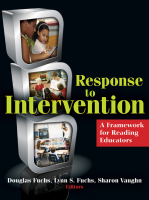 Each year IRA's bimonthly newspaper, Reading Today,
features a survey of literacy leaders to determine the hottest topics in the field. The complete listing of what's hot and
what's not in literacy for 2009 will appear in the February/March issue of Reading Today, but here's your sneak peek at one
"very hot" topic for 2009. For the second year in a row, Response to Intervention (RTI) is "very hot."
Each year IRA's bimonthly newspaper, Reading Today,
features a survey of literacy leaders to determine the hottest topics in the field. The complete listing of what's hot and
what's not in literacy for 2009 will appear in the February/March issue of Reading Today, but here's your sneak peek at one
"very hot" topic for 2009. For the second year in a row, Response to Intervention (RTI) is "very hot."
To learn what you need to know to implement RTI in your school or district, turn to the expert advice in
Response to Intervention: A Framework for Reading Educators. Leading experts in literacy and
special education outline a three-tier approach to implementing RTI that begins with effective instruction for all
children, moves to preventive tutoring, and concludes with a reformed concept of special education.
To learn more about RTI, download Chapter 5 of Response to Intervention: A Framework for Reading Educators:
Free chapter: Implications of RTI for the Reading Teacher
To read more about the book or order online, click here.
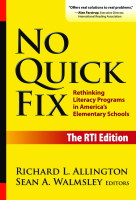 If you're looking for a cogent primer on early intervention, check out the bestselling, groundbreaking resource
No Quick Fix, THE RTI Edition. This special edition outlines the key factors essential for effective reform of early
literacy programs and features proven, cost-effective models of early intervention and successful case studies that
fit the RTI model.
If you're looking for a cogent primer on early intervention, check out the bestselling, groundbreaking resource
No Quick Fix, THE RTI Edition. This special edition outlines the key factors essential for effective reform of early
literacy programs and features proven, cost-effective models of early intervention and successful case studies that
fit the RTI model.
To read more about the book or order online, click here.
Hear Richard L. Allington—one of No Quick Fix's editors—discuss research-supported models for early reading
intervention:
Podcast: Allington on RTI
 To learn more about what reading teachers need to know about RTI, download a recent article from The Reading Teacher—IRA's
peer-reviewed journal for educators working with children up to age 12:
To learn more about what reading teachers need to know about RTI, download a recent article from The Reading Teacher—IRA's
peer-reviewed journal for educators working with children up to age 12:
Free article: Response to Intervention (RTI): What Teachers of Reading Need to Know
To read more about The Reading Teacher or subscribe online, click here.
Read-aloud help for ELLs…
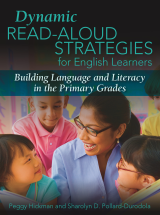 Mrs. Lee: During story retelling, Manuel does not participate as much as [the other students]...because he is repeating
what the other kids are saying. He tries hard. I briefly explain to him what is going on in the story and I tell him to
pay close attention to the pictures. This helps him understand better....
Mrs. Lee: During story retelling, Manuel does not participate as much as [the other students]...because he is repeating
what the other kids are saying. He tries hard. I briefly explain to him what is going on in the story and I tell him to
pay close attention to the pictures. This helps him understand better....
Mrs. Lee, a monolingual, English-speaking teacher in a large urban school, is concerned that some of her first-grade
English-language learners do not participate in class discussions about the books she reads aloud. If you're a primary grade
teacher with ELLs in your classroom, you've probably shared her frustration. But you can help your
ELLs with the read-aloud activities you already use in your classroom. Find the strategies you need to transform your
read-aloud activities into powerful tools for developing listening comprehension and oral language proficiency in your
language learners in a new book, Dynamic Read-Aloud Strategies for English Learners: Building Language and
Literacy in the Primary Grades.
To learn more about strategies to help your ELLs understand what's being read in class, download Chapter 1 of
Dynamic Read-Aloud Strategies for English Learners:
Free chapter: Strategic Read-Aloud Lessons: What the Research Says
To read more about this book or order online, click here.
School-based PD: What Research Has to Say…
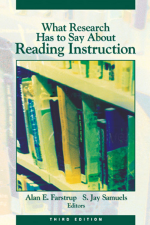 Shape a meaningful and cost-effective professional development experience for yourself and your colleagues with study group
strategies found in the Professional Development Edition of
What Research Has To
Say About Reading Instruction. In addition to a copy of the book, this PD edition includes a facilitator's
guide with ideas and strategies for leading the group, a CD with handouts and forms, and the option to purchase
additional books at a 10% discount.
Shape a meaningful and cost-effective professional development experience for yourself and your colleagues with study group
strategies found in the Professional Development Edition of
What Research Has To
Say About Reading Instruction. In addition to a copy of the book, this PD edition includes a facilitator's
guide with ideas and strategies for leading the group, a CD with handouts and forms, and the option to purchase
additional books at a 10% discount.
Professional development study groups are the most meaningful when everyone is part of the discussion. To engage all group participants—regardless of level of background knowledge or ability—in the discussion process, try an adaptation of Linda Hoyt's "Hot Seats" interactive group design activity.
Form groups of three to four participants and assign each a topic from the book to be discussed. Working together, the participants should use the text and their own background knowledge to "become the experts" on their assigned topic. The first group moves to the front of the class and audience members take turns posing questions about the group's topic. As each question is asked, group members put their heads together to discuss and, in turn, each member acts as spokesperson to deliver the answer. The process continues until all groups have been "in the hot seat."
To try a "mini PD edition"—a free chapter from the book, accompanied by the corresponding section in the PD edition facilitator's guide—download these sample resources:
Free chapter: Research on Reading/Learning Disability Interventions and Facilitator's guide sample
To learn more about this PD edition or order online, click here.
To read more excerpts from the book, What Research Has to Say About Reading Instruction, edited by Alan E. Farstrup and S. Jay Samuels, check out these other free chapter downloads:
Free chapter: The Importance of Effective Early Intervention
Free chapter: Metacognition and Self-Regulated Comprehension
To read more about What Research Has to Say About Reading Instruction or order online, click here.
It's time for the Wild Words Game Show!
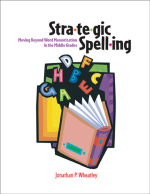 Put on your best game show host persona. Assemble your teams. And cue the cheesy theme song....It's time to play the
Wild Words Game Show!
Put on your best game show host persona. Assemble your teams. And cue the cheesy theme song....It's time to play the
Wild Words Game Show!
Throw away those boring weekly word memorization lists and teach your middle grade students a better way to spell
with language patterns and spelling strategies outlined in Strategic Spelling. The Wild Words Game Show pits teams of two or three students
in a word challenge competition of three to five words. Students work together to list the most logical
spelling for each word based on their use of spelling strategies including syllables, word-in-word, rhyme, and
spelling-meaning connection. They record their spelling, the strategies they used, and evidence of why their
strategies work. Their efforts are scored based on 3 possible points per spelling—one each for correct spelling,
use of appropriate strategies, and evidence provided. Keep team scores listed on the board to encourage friendly
competition between the teams and offer random rewards such as a special privilege.
For more strategies that will make spelling fun and engaging for your students, download Chapter 3 of
Strategic Spelling:
Free chapter: Pattern Activities
To read more about the book or order online at the special price of $9.95, click here.
To see other selected IRA books on sale for under $10 for a limited time, click here.
Reading Today Daily headlines: Links to hot topics in literacy news…
Good news, bad news in "Reading on the Rise" report
Using "computer-esque" books to lure boys to read
ReadWriteThink.org offers February calendar
TV for tots does more harm than good, study says
Members get 20% off the price of books featured here. Click here to join IRA and get the discount.
IRA Gateway is produced by the Marketing Division of the International Reading Association.
International Reading Association • 800 Barksdale Road • Newark, DE 19711, USA • 800-336-7323
Outside the United States and Canada, call 302-731-1600 • http://www.reading.org